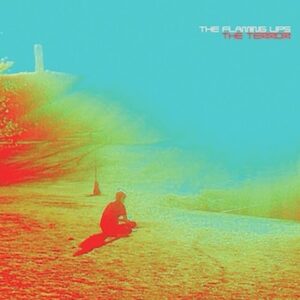It had to happen eventually. After years of embracing the cult pop stardom that comes with unleashing an album of the quality of ‘Yoshimi battles the pink robots’, the former punk rockers who took acid have returned to their tormented, arty roots ( a transition that began with ‘embryonic’) to unleash an album that will undoubtedly cleave their fan base down the middle, the music here most closely resembling what would happen if Aphex Twin remixed the entire Beach Boys back catalogue.
Opening with ‘look, the sun is rising’, the listener is buried under a layer of whistling synth, feedback and echoing voices. It is immediately clear that this multi-textured release is not for everyday consumption, the somnambulant rhythms phasing in ad out of space as the melodies pile up on top of one another to make one blissful whole that is as unexpected as it is beautiful. This is not music in the conventional sense, I’m not convinced it falls into the category of rock at all, but sun-dappled experimentalism that will alienate as many as it entices. ‘Be free, a way’ asserts “the sun shines down, but we can’t see the light lights everything the same” over chiming noise that recalls Toro y moi at their most chilled out, whilst the vocals mildly distort as if Wayne Coyne and co. are mildly embarrassed at the lush beauty of the soundscapes they are creating. Still operating in the other-worldly ambient territory of Aphex Twin and with a hint of FSOL thrown in for good measure, ‘try to explain’ mixes throbbing, overloaded industrial noise with some utterly stunning vocal work that is shot through with a near impenetrable melancholy. Darker and deeper still are the wheezing rhythms of ‘you lust’ which comes across as the spiritual son to Pink Floyd’s ‘Welcome to the machine’, only with the focus deeply personal as opposed to looking out with disgust toward the music industry. Strangely calming and yet lyrically vitriolic, it is one of the album’s highlights with its lengthy, hypnotic coda.
Having drawn you ever deeper, the listener finds themselves approaching the centre of this dark and dreamy album in the company of a title track that introduces a trip-hop beat and high-pitched vocals, with the result that it transpires to be a creepy cross between massive attack and Arcade Fire. The titular terror is strangely ill-defined, buried under layers of distorted electronica until a monstrous guitar riff, heavily compressed and treated, is unleashed, pouring torrents of obsidian blackness across the increasingly disjointed track, ripping holes in the melody in a manner that is almost shockingly violent when contrasted to the eerie calm of the opening tracks, and it is clear, finally, that this is one trip that was destined to turn sour from the off. ‘You are alone’ offers little comfort, that unsettling Aphex Twin connection rearing its head once more as Wayne’s voice drifts, isolated, on a sea of stuttering noise. ‘Butterfly, how long it takes to die’ is the most energetic track on offer here, and again the listener is reminded of Pink Floyd at their most experimental (imagine a cross between ‘ummagumma’ and the aborted ‘Household objects’ and you’ll have a fair idea of what’s awaiting you), Wayne’s increasingly sublime voice offset by jagged shards of guitar penetrating the mix with sudden force, only to be withdrawn again before the blood really starts to flow leaving you adrift in a tranquil sea that soothes away the fevered thrashing and leaves you becalmed, in the eye of the storm and filled with trepidation about what will happen next. ‘Turning violent’ sees a disturbing throb slowly edge into your consciousness, building up until huge metallic layers of noise slam out of the whirling debris and send you hurtling back out into the devastating storm in preparation for the bleak finale, ‘always there in our hearts’, the innocuous title of which does much to hide its truly appalling notion that violence and death always lurk, close to the surface, within the human psyche. It is not the most comforting of notions, and it is delivered over an agitated backing that is part NIN industrial terror, part Pink Floyd lysergic nightmare.
‘The terror’ is the sound of the Flaming Lips jettisoning the security of their commercial peak and making a stark bid to reclaim their avant-garde crown with an album that is conceptually bleak and musically jarring. There is no doubt that those fans who jumped on board for the band’s Warner years will be less than impressed with the absence of traditionally structured tunes, the album working instead as a free form piece that ebbs and flows over its 9 tracks and fifty-five minutes, washing between the warmly soothing sounds of the album’s opening tracks to the terrifying metallic scree of its closing numbers. However, for those who have long enjoyed the Flaming Lips’ various collaborations, permutations and mutations, ‘the terror’ is a welcome trip through a psychedelic valley in which few souls dare tread. Never dull, highly imaginative and ultimately rewarding thanks to the depth of the compositions, ‘the terror’ is an eclectic flight of fancy from a band that have rarely enjoyed the banality of standing still and it should be regarded as a triumph.




